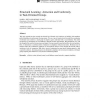Free Online Productivity Tools
i2Speak
i2Symbol
i2OCR
iTex2Img
iWeb2Print
iWeb2Shot
i2Type
iPdf2Split
iPdf2Merge
i2Bopomofo
i2Arabic
i2Style
i2Image
i2PDF
iLatex2Rtf
Sci2ools
100
click to vote
CMOT
1999
1999
Structural Learning: Attraction and Conformity in Task-Oriented Groups
This study extends previous research that showed how informal social sanctions can backfire when members prefer friendship over enforcement of group norms. We use a type of neural network to model the coordination of informal social control in a small group of adaptive agents confronted with a social dilemma. This model incorporates two mechanisms of social influence, informal sanctions and imitation. Both mechanisms vary with the strength of the social tie between source and target. Previous research focused on the effects of social sanctions. Here, we demonstrate a curvilinear effect of imitation on compliance with prosocial norms. Moderate doses of imitation reduce the coordination complexity of self-organized collective action and help the network achieve satisfactory levels of cooperation. High doses, however, undermine the agent-based learning required to find cooperative solutions. Increasing group size also diminishes compliance due to increased complexity, with larger groups ...
Related Content
| Added | 22 Dec 2010 |
| Updated | 22 Dec 2010 |
| Type | Journal |
| Year | 1999 |
| Where | CMOT |
| Authors | James A. Kitts, Michael W. Macy, Andreas Flache |
Comments (0)

